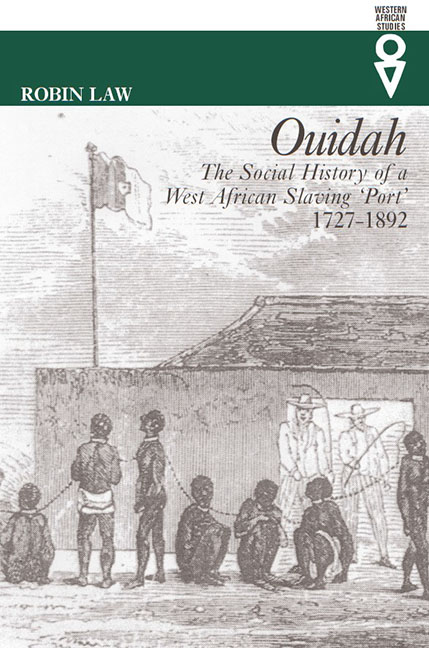
- Publisher:
- Boydell & Brewer
- Online publication date:
- October 2017
- Print publication year:
- 2017
- Online ISBN:
- 9781782049760
- Subjects:
- Area Studies, African Studies, History, African History


Ouidah, an indigenous African town in the modern Republic of Benin, was the principal pre-colonial commercial centre of its region, and the second most important town of the Dahomey kingdom. It served as a major outlet for the export of slaves for the trans- Atlantic trade. Between the seventeenth and the nineteenth centuries Ouidah was the most important embarkation point for slaves in the region of West Africa known to outsiders as the 'Slave Coast'. Exporting over a million slaves, it was second only to Luanda in Angola for the embarkation of slaves in the whole of Africa. The author's central concerns are the organization of the African end of the slave trade, and the impact participation in the trade had on the historical development of the African societies involved. It shifts the focus from the viewpoint of the Dahomian monarchy, represented in previous studies, to the coast. Here is a well documented case study of pre-colonial urbanism, of the evolution of a merchant community, and in particular the growth of a group of private traders whose relations with the Dahomian monarchy grew increasingly problematic over time.
"This work is a masterful chronological history of a community, especially the history of its merchant families. Although grounded in archival research, the book's collection of oral traditions from descendants of the Ouidah merchants makes this study of an urban community unique. Especially important is the history of the Brazilians among them, because many of these merchants were ex-slaves themselves and Portuguese was the lingua franca. - R.T. Brown in CHOICE This magisterial volume, an impressive contribution to the history of West Africa and of the slave trade, together with his numerous other published works, highlights Robin Law as one of the most distinguished historians in the field of African history. - Christopher Fyfe in AFRICAN STUDIES Ouidah offers a great deal more than just a case study of slave traffic. Professor Law examines the town from the inside out, and from its obscure Hueda origins to its occupation by the French in 1892 via its long incorporation into the kingdom of Dahomey. Slaving features as a staple of the local economy - the merchants and officials of Ouidah served as middlemen in the sale of slaves taken elsewhere - and is a recurring theme, but the character of the town and its inhabitants are also dealt with at length. Of course, they are inextricably linked. ... Professor Law excels in reconstructing the topography, society and administrative history of Ouidah under successive regimes and relating these structures to the conduct of external trade, both for slaves and, latterly, for palm oil. - Richard Gorski in HISTORYThis book is an excellent case study on the formation, growth and decline of Ouidah's Atlantic merchant community and of the town itself. ... this is a very informative book. It provides a detailed analysis of the formation and growth of Ouidah's trade community and its relations with Dahomey in the era of Atlantic commerce. - Ibrahima Thiaw in the INTERNATIONAL REVIEW OF SOCIAL HISTORY"
 Loading metrics...
Loading metrics...
* Views captured on Cambridge Core between #date#. This data will be updated every 24 hours.
Usage data cannot currently be displayed.